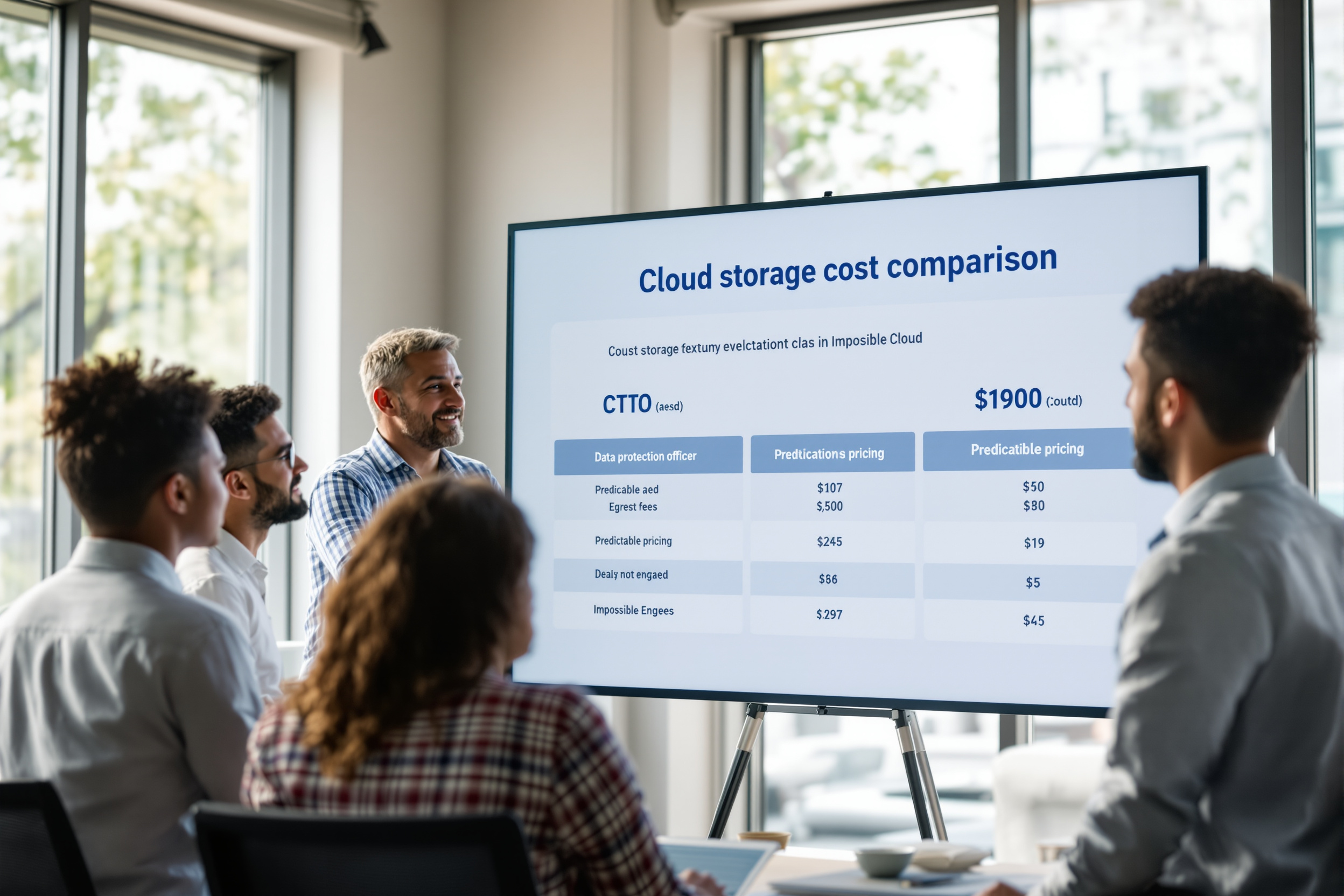Topics on this page
Organizations seeking the cheapest S3 storage often find that headline prices are misleading. The true cost is obscured by hidden charges for data egress, API calls, and minimum storage durations, which can inflate bills by 3-5x. This unpredictability creates significant budget risk and vendor lock-in. An effective strategy requires shifting focus from per-gigabyte rates to the total cost of ownership. A predictable pricing model, full S3 compatibility, and an architecture designed for performance are the key levers for achieving up to 80% in real cost savings.
Key Takeaways
- The cheapest S3 storage is defined by predictable total costs, not just the per-gigabyte price, eliminating egress and API fees to save 60-80%.
- Full S3 compatibility is essential for a seamless transition, allowing businesses to use existing tools and scripts without code rewrites.
- Enterprise-grade security features like Immutable Object Lock are critical for ransomware protection and are becoming a standard for cyber insurance.
Exposing the Hidden Costs in Cloud Storage
Cost unpredictability is the number one cloud pain point for most enterprises in 2025. Surprise egress fees and API charges consistently erode IT budgets. These hidden costs can exceed storage costs by 3-5x in data-intensive workloads. This makes accurate budget forecasting a significant challenge for IT leaders. This financial uncertainty is a direct result of complex pricing models designed to penalize data movement. Organizations need a transparent model to regain control. The first step is understanding your data egress fees. This approach sets the stage for a more predictable financial framework.
Achieve Predictable Cloud Costs by Design
A truly cost-efficient S3 storage solution eliminates variable charges entirely. Impossible Cloud offers a predictable model with zero egress fees and no API call costs. This transparent approach can eliminate 60-80% of typical cloud storage expenses. There are also no minimum storage duration penalties, offering complete financial flexibility. This model makes budget planning for petabyte-scale storage actually possible. To achieve this, a provider must focus on a simple, clear economic framework. Here is what a predictable model includes:
- Zero charges for data egress or retrieval.
- No fees for API requests (GET, PUT, LIST).
- No minimum storage duration requirements.
- A flat, per-terabyte price for all data.
This transparent structure provides the foundation for building resilient, cost-effective data strategies.
Demand Enterprise-Grade Security and Compliance
The most affordable object storage must also meet stringent enterprise requirements. Security is non-negotiable, with ransomware attacks increasingly targeting backup infrastructure. Immutable Storage with Object Lock provides essential ransomware protection. This feature is rapidly becoming a baseline for cyber insurance compliance. Impossible Cloud is certified for SOC 2 and ISO 27001, ensuring it meets standards for regulated workloads. Data is protected with multi-layer encryption, both in transit and at rest. Identity and Access Management with MFA and RBAC provides granular control over your data. This robust security posture ensures your data remains secure without compromising on cost efficiency.
Ensure Full S3 Compatibility for Seamless Migration
A viable AWS S3 alternative must offer drop-in compatibility to protect existing investments. Full S3-API compatibility ensures your existing applications, scripts, and tools continue working without code rewrites. This minimizes migration risk and accelerates time-to-value by up to 50%. The process should be as simple as changing the endpoint in your configuration. An S3-compatible alternative should support:
- Standard object operations for seamless integration.
- Advanced capabilities like versioning and lifecycle management.
- Out-of-the-box integrations with leading backup tools like Veeam.
- Consistent performance across API, CLI, and SDK interfaces.
This level of compatibility makes switching a low-risk, high-reward decision for any IT team.
Leverage an 'Always-Hot' Architecture for Superior Performance
Complex storage tiering often introduces delays, failures, and surprise restore fees. An 'Always-Hot' object storage model ensures all data is immediately accessible without tier-restore delays. This architecture reduces operational complexity and keeps third-party tools stable. It delivers up to 20% faster backup performance compared to traditional cloud storage. This model eliminates fragile lifecycle policies that can lead to API timeouts and hidden operational costs. By keeping all data ready for access, you ensure predictable performance for backups, analytics, and urgent restores. This simplified approach is key to maintaining both speed and cost control.
Empower MSPs with Predictable Margins and Management
For MSPs, resellers, and system integrators, predictable costs are a competitive advantage. A model with zero egress or API fees allows for stable, defensible margins on BaaS and DRaaS offerings. This means you can quote customers with confidence, knowing your margins are protected from surprise bills. The partner console simplifies operations with multi-tenant management and automation via API/CLI. Fast onboarding enables partners to deploy solutions for clients in under 24 hours. This predictability allows MSPs to pass savings to customers or increase profitability on existing contracts. It transforms cloud storage from a cost center into a growth engine.
Build a Real Exit Strategy to Break Free from Vendor Lock-In
Vendor lock-in is a top concern for over 70% of enterprise IT leaders. Punitive egress fees and proprietary APIs make switching prohibitively expensive. A true alternative to AWS storage must be built on open standards. S3-compatible APIs and a policy of no egress fees are the foundation of data portability. This preserves your negotiation power and long-term freedom of action. An exit strategy should be a day-one requirement, not an afterthought. By choosing a platform designed for interoperability, you ensure your data remains under your control. This provides the strategic flexibility needed to adapt to future market changes.
More Links
The Federal Statistical Office (Destatis) provides a press release likely containing statistical data relevant to the German economy.
The Federal Statistical Office (Destatis) offers a table on the use of cloud computing in businesses within the ICT sector in Germany.
PwC Germany discusses cloud governance in Germany, covering regulatory and risk management aspects of cloud adoption.
The European Union Agency for Cybersecurity (ENISA) provides a PDF document about cloud computing, covering security and risk management.
Deloitte Insights features an article on AI infrastructure, hybrid cloud, and cost optimization, focusing on emerging technologies.
The German Federal Ministry of Finance offers an analysis from its monthly report regarding the use of third-party clouds.
Fraunhofer ISST presents a report on resource-efficient cloud and data economy in Germany (Green IT).
FAQ
How does a 'no egress fee' model deliver the cheapest S3 storage?
By eliminating egress fees, which can account for a large portion of a cloud bill, the total cost of ownership becomes significantly lower and more predictable. This makes it the cheapest option for workloads with regular data access, such as backup, disaster recovery, and content delivery.
What compliance certifications are important for enterprise S3 storage?
For enterprise workloads, especially in regulated industries, key certifications include SOC 2 Type II and ISO 27001. These verify that the storage provider meets high standards for security, availability, and confidentiality.
What does 'Always-Hot' storage mean?
Always-Hot storage means all data is stored in a single, high-performance tier and is always immediately accessible. This eliminates the delays and retrieval fees associated with moving data from 'cold' or archival tiers, simplifying operations and ensuring fast performance.
How does S3 compatibility benefit MSPs?
S3 compatibility allows MSPs to use their existing ecosystem of S3-native tools for backup, archiving, and management. Combined with predictable costs, it enables them to build profitable and competitive Backup-as-a-Service (BaaS) and Disaster-Recovery-as-a-Service (DRaaS) offerings with stable margins.



.png)
.png)
.png)
.png)



.png)




%201.png)